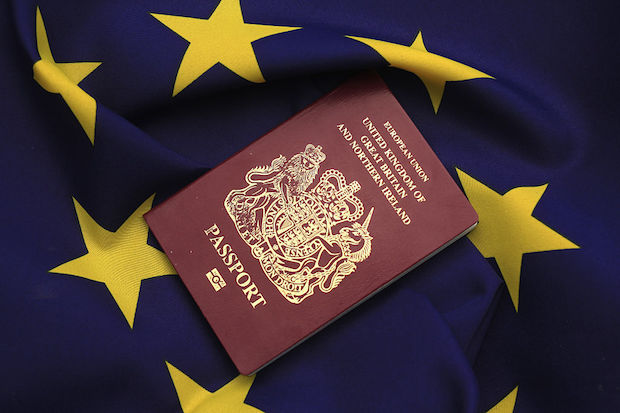The blue passport has become one of those symbols of Brexit, mocked by Remainers and taken really very seriously by Brexiteers. So it’s fitting that the row about is production tells us so much about the way the two camps operate. The current manufacturer of the Burgundy passport is De La Rue, a British supplier, and today that company complained to the BBC that Franco-Dutch firm Germalto had won the contract for the blue passport. Cue nervous responses from ministers such as Matt Hancock about the passport, and plenty of hyperbole from both Brexiteers and Remainers about the news.
Those who didn’t want Britain to leave the European Union are scoffing that this shows the fallacy of the ‘taking back control’ argument, and that British businesses are going to lose out as a result of Brexit. Those who were delighted by the referendum result think it shows contempt for Leave voters because the blue passport was supposed to be a symbol of British independence.
But what Remainers who are scoffing at this decision – which hasn’t yet been signed off, by the way – are doing is caricaturing the Brexit result as being about protectionism and Britain not doing any trade with its EU partners. Even those in favour of a Singapore-style model aren’t arguing that there should be no trade at all between Britain and other European countries – and they are certainly not suggesting that everything should be British made. This is particularly worth remembering given De La Rue also manufactures passports for countries other than Britain.
Leavers, for their part, aren’t helping this impression by getting so furious about the manufacture of the passports that they’ve forgotten that there is going to be a new passport and, more importantly, that Brexit should be about opening up opportunities, not Britain closing in on itself. Theresa May has been trying to strike that upbeat note more in recent months, and rather than complaining about the potential for the contract to go elsewhere, presumably to a firm that will provide the taxpayer with better value, those trying to persuade their opponents of the value of Brexit would do better to focus on how open Britain is going to be as a result of leaving the EU, not how miserable and crabby it should become.
Fundamentally, there is a wilful misunderstanding between the two camps. Remainers want to caricature Brexiteers as being jingoistic protectionists, while Brexiteers want to suggest that Remainers are so loopily in love with the EU that they want to move there and hand over all Britain’s business to it too. The longer these caricatures persist, the harder it will be to heal the divisions in Brexit Britain.







Comments